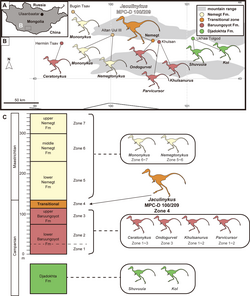Jaculinykus
| Jaculinykus Temporal range: Late Cretaceous,
| |
|---|---|

| |
| Holotype specimen and skeletal reconstruction | |
| Scientific classification | |
| Domain: | Eukaryota |
| Kingdom: | Animalia |
| Phylum: | Chordata |
| Clade: | Dinosauria |
| Clade: | Saurischia |
| Clade: | Theropoda |
| Family: | †Alvarezsauridae |
| Subfamily: | †Parvicursorinae |
| Genus: | †Jaculinykus |
| Species: | †J. yaruui
|
| Binomial name | |
| †Jaculinykus yaruui Kubo et al., 2023
| |
Jaculinykus (meaning "Jaculus claw") is an extinct genus of alvarezsaurid theropod dinosaur from the Late Cretaceous Baruungoyot Formation of Mongolia. The genus contains a single species, J. yaruui, known from a nearly complete articulated skeleton including bones of the skull. Jaculinykus is notable for its unique hand, which has a hypertrophied first digit and greatly reduced second digit, which is intermediate between the tridactyl hand of Shuvuuia and monodactyl hand of Linhenykus.[1]
Discovery and naming
[edit]
The Jaculinykus holotype specimen, MPC-D 100/209, was discovered in sediments of the Baruungoyot Formation (Nemegt locality), of Ömnögovi Province, Mongolia. The specimen consists of a nearly complete skeleton with most of the skull.[1]
In 2023, Kubo et al. described Jaculinykus yaruui as a new genus and species of parvicursorine alvarezsaurid based on these fossil remains. The generic name, "Jaculinykus", combines a reference to the Jaculus, a small dragon in Greek mythology with the Greek word "onykus," meaning "claw". The specific name "yaruui" is derived from "yaruu" ("яаруу"), the Mongolian word for "speedy" or "hasty".[1]
Classification
[edit]
Jaculinykus was added to a phylogenetic analysis and found to be in the clade Parvicursorinae, in a clade consisting of all alvarezsaurs from the Nemegt Basin. The cladogram from Kubo et al. (2023) is shown below:[1]
Paleoecology
[edit]
Fossils of Ondogurvel, another parvicursorine alvarezsaurid, as well as fossils of Nemegtomaia, an oviraptorosaur, are also known from the Nemegt locality of the Mongolian Barun Goyot Formation.[2] Other localities from the formation have yielded dinosaurs including additional alvarezsaurids (Ceratonykus, Khulsanurus, and Parvicursor),[1] as well as dromaeosaurs (Hulsanpes,[3] Kuru, and Shri[4]), oviraptorosaurs (Conchoraptor and Heyuannia),[5] a sauropod (Quaesitosaurus),[6] ceratopsians (Bagaceratops and Breviceratops),[7] a pachycephalosaur (Tylocephale),[8] and ankylosaurs (Saichania,[9] Tarchia,[10] and Zaraapelta[11]).
References
[edit]- ^ a b c d e Kubo, Kohta; Kobayashi, Yoshitsugu; Chinzorig, Tsogtbaatar; Tsogtbaatar, Khishigjav (2023-11-15). "A new alvarezsaurid dinosaur (Theropoda, Alvarezsauria) from the Upper Cretaceous Baruungoyot Formation of Mongolia provides insights for bird-like sleeping behavior in non-avian dinosaurs". PLOS ONE. 18 (11): e0293801. doi:10.1371/journal.pone.0293801. ISSN 1932-6203. PMC 10651048.
- ^ Fanti, F.; Currie, P. J.; Badamgarav, D.; Lalueza-Fox, C. (2012). "New specimens of Nemegtomaia from the Baruungoyot and Nemegt Formations (Late Cretaceous) of Mongolia". PLOS ONE. 7 (2): e31330. Bibcode:2012PLoSO...731330F. doi:10.1371/journal.pone.0031330. PMC 3275628. PMID 22347465.
- ^ Osmólska, H. (1982). "Hulsanpes perlei n.g. n.sp. (Deinonychosauria, Saurischia, Dinosauria) from the Upper Cretaceous Barun Goyot Formation of Mongolia". Neues Jahrbuch für Geologie und Paläontologie, Monatshefte. 1982 (7): 440–448. doi:10.1127/njgpm/1982/1982/440.
- ^ Napoli, J. G.; Ruebenstahl, A. A.; Bhullar, B.-A. S.; Turner, A. H.; Norell, M. A. (2021). "A New Dromaeosaurid (Dinosauria: Coelurosauria) from Khulsan, Central Mongolia" (PDF). American Museum Novitates (3982): 1–47. doi:10.1206/3982.1. hdl:2246/7286. ISSN 0003-0082. S2CID 243849373.
- ^ Funston, G. F.; Mendonca, S. E.; Currie, P. J.; Barsbold, R. (2018-04-01). "Oviraptorosaur anatomy, diversity and ecology in the Nemegt Basin". Palaeogeography, Palaeoclimatology, Palaeoecology. THE LATE CRETACEOUS NEMEGT ECOSYSTEM: DIVERSITY, ECOLOGY, AND GEOLOGICAL SIGNATURE. 494: 101–120. Bibcode:2018PPP...494..101F. doi:10.1016/j.palaeo.2017.10.023. ISSN 0031-0182.
- ^ Kurzanov, S. M.; Bannikov, A. F. (1983). "A new sauropod from the Upper Cretaceous of Mongolia". Paleontological Journal. 2: 90−96.
- ^ Czepiński, Łukasz (2020-11-25). "Ontogeny and variation of a protoceratopsid dinosaur Bagaceratops rozhdestvenskyi from the Late Cretaceous of the Gobi Desert". Historical Biology. 32 (10): 1394–1421. doi:10.1080/08912963.2019.1593404. ISSN 0891-2963. S2CID 132780322.
- ^ Maryańska, T.; Osmólska, H. (1974). "Pachycephalosauria, a new suborder of ornithischian dinosaurs" (PDF). Palaeontologica Polonica (30): 45−102.
- ^ Carpenter, K., Hayashi, S., Kobayashi, Y., Maryańska, T., Barsbold, R., Sato, K., and Obata, I., 2011,"Saichania chulsanensis (Ornithischia, Ankylosauridae) from the Upper Cretaceous of Mongolia", Palaeontographica, Abteilung A, 294(1-3): 1-61
- ^ Maryańska, T. 1977. "Ankylosauridae (Dinosauria) from Mongolia". Palaeontologia Polonica 37: 85-151
- ^ Arbour, Victoria M.; Currie, Philip J.; Badamgarav, Demchig (2014-10-27). "The ankylosaurid dinosaurs of the Upper Cretaceous Baruungoyot and Nemegt formations of Mongolia". Zoological Journal of the Linnean Society. 172 (3): 631–652. doi:10.1111/zoj.12185. ISSN 0024-4082.










